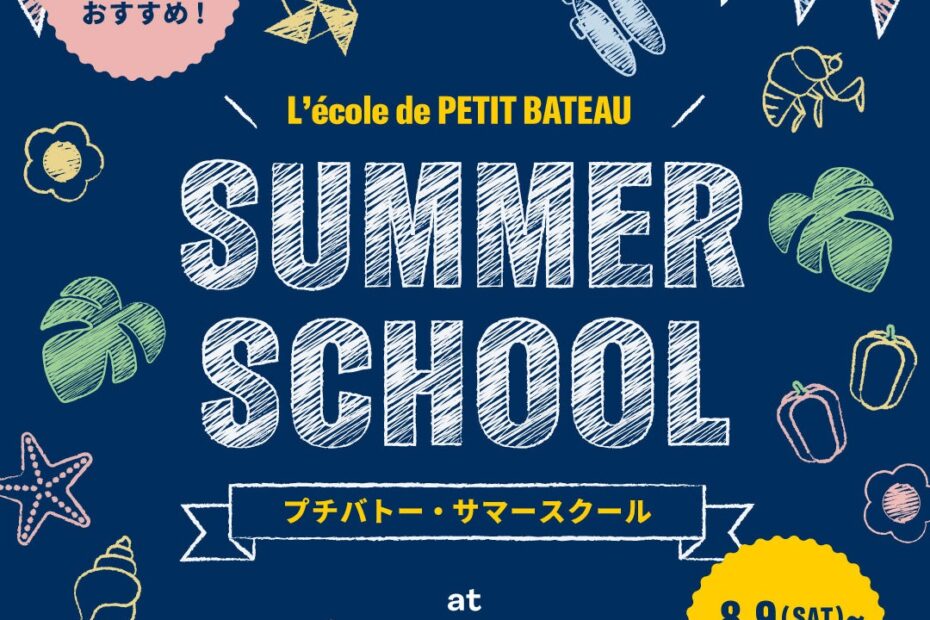[Petit Bateau] Classes are open again this year! Petit Bateau Summer School is a special experience where you can get in touch with nature and become engrossed in learning.
Petit Bateau Japan Co., Ltd. Press release: July 17, 2025 To Members of the Media Classes are starting again this year! Petit Bateau Summer School is being held, a special experience where you can get in touch with nature and become engrossed in learning. Petit Bateau will hold an experiential event for elementary school students, “L’ecole de PETIT BATEAU | SUMMER SCHOOL,” for three days from Saturday, August 9th to Monday, August 11th, 2025.
https://prcdn.freetls.fastly.net/release_image/147432/17/147432-17-f9b9a4acabf302952ccf0907414a639e-1080×1080.jpg Petit Bateau’s summer school was a big hit last year. This year, the theme is “connecting with nature,” and there will be a variety of workshops perfect for independent research, such as sowing plant seeds, measuring the vitamin C of vegetables, observing beach sand and cicadas, deciphering DNA (genes), the common language of living things, and taking photos with a handmade pinhole camera. This program is full of “learning opportunities” that will stimulate children’s curiosity. Name: L’ecole de PETIT BATEAU | SUMMER SCHOOL (Petit Bateau Summer School) Date: August 9th (Sat) – 11th (Mon, holiday), 2025 Time: 10:00-17:30 Target: Elementary school students Location: Suginami Science Lab IMAGINUS (2-14-13 Koenji Kita, Suginami-ku, Tokyo) Reservations start: Friday, July 18, 2025 How to make a reservation: Make a reservation through the menu on Petit Bateau’s official LINE ▶︎Official LINE here https://lin.ee/56uZwjk Special page: https://www.petit-bateau.co.jp/pages/summer-school-2025 *Please check the special page for details such as the date and time of the event and participation fees. PLANET GARDEN “Let’s connect seeds from seeds on a small earth” Lecturer: SEEDS OF LIFE institute Image
URL: https://prcdn.freetls.fastly.net/release_image/147432/17/147432-17-cd5f0fb09e73d1a4b1a4ff8fc009bd72-2800×1867.jpg “Planet Garden” is a small planter that reproduces the same mechanism as the Earth. You can learn how nature nurtures life by sowing seeds. When you get home, observe the workings of nature while growing plants. If you’re lucky, you can grow them from seed to seed. PLANET GARDEN “Let’s make a companion plant garden” Lecturer: SEEDS OF LIFE institute
https://prcdn.freetls.fastly.net/release_image/147432/17/147432-17-08d35accf2c0a261bafd23aff94bedf3-2800×1867.jpg “Planet Garden” is a small planter that recreates the Earth. You can learn how nature nurtures life and the symbiotic relationship between plants by sowing the seeds of “companion plants” where plants help each other. When you get home, observe how nature works while growing plants. If you’re lucky, you can grow them from seed to seed. Let’s find out the nutritional value of vegetables! ~An experiment to investigate vitamin C~ Instructor: General Incorporated Association SEEDS OF LIFE institute
https://prcdn.freetls.fastly.net/release_image/147432/17/147432-17-ed24cf69c55e4f7db4ec844b6b800791-2222×1482.jpg How does the inside of a vegetable differ depending on the part, type, and how it is grown? We will conduct an experiment to examine the vitamin C content of various vegetables. Let’s discover the
differences together! The experiment content differs for lower and upper grades, so please apply according to your child’s grade level. Learn about the nature of the sea and beaches from the city ~ Beach quest & microplastic hunting ~ Lecturer: Nature Conservation Society of Japan (NACS-J)
https://prcdn.freetls.fastly.net/release_image/147432/17/147432-17-b2f3aded3cf41dcc981d67df5176d2ff-2222×1482.jpg Many creatures live on beautiful sandy beaches. However, invisible plastic waste is affecting these creatures. In this workshop, we will learn about beach biodiversity and marine littering issues, and think about what we can do. Let’s find a small step together that we can take today to protect our beaches. Cicada shell observation event – Learn about cicada shells seen in central Tokyo – Lecturer: Nature Conservation Society of Japan (NACS-J)
https://prcdn.freetls.fastly.net/release_image/147432/17/147432-17-684b46a31d6c061ad1deb733472324a9-1819×1364.jpg There are actually six types of cicadas living in central Tokyo. In this workshop, you will have fun learning about the characteristics and ecology of each cicada. You can also pick up real shells and experience how to distinguish between different types. Why not take a look at the world of cicadas, which is familiar to us but surprisingly unknown to us? It’s also perfect for a summer vacation independent study project! The Secret of DNA: The Blueprint of the Body Made of Four Letters Lecturer: Dr. Norihiro Yumoto (Medicine)
https://prcdn.freetls.fastly.net/release_image/147432/17/147432-17-bcb5d3e3197f64e509d9d6f8e17cbe5c-1536×1024.jpg DNA, the blueprint for proteins that make up the human body, is the “code of life” written in just four letters (A, T, G, and C). In this workshop, children will have fun learning about the structure of DNA and how proteins are made through a puzzle-like experience of solving the code. Lower grades will playfully use colors and shapes as clues, while upper grades will seriously try to decipher genes! Why not join us and enjoy a learning experience that allows you to “create something with your own hands” while feeling a connection with nature? Exciting and surprising! Pinhole photography Lecturer: Nature Conservation Society of Japan (NACS-J)
https://prcdn.freetls.fastly.net/release_image/147432/17/147432-17-8d87f7656e984351fec81182949ab48d-559×372.jpg This is a program where you can make a pinhole camera made of paper without a lens, take pictures using black and white photographic paper, and experience developing photos in a darkroom. You can experience photography while understanding the properties of light. We will explain the history of photography and how it reflects things, and use a model of a pinhole camera to learn that images are actually inverted. We will also present the photos we took and discuss them together. Make it from “paper”! Message Card Workshop Instructor: Suginami Science Lab IMAGINUS, Creating the Future
https://prcdn.freetls.fastly.net/release_image/147432/17/147432-17-a88ccb3df600e88c551b21569acd42ff-672×448.jpg Peel the plant fiber “pulp” from a paper carton and recycle it into a message card! You can experience “papermaking,” the process of dissolving pulp in water and turning it into paper. It’s surprisingly difficult when you try it, so please give it a try! By doing it yourself, you’ll surely become interested in “recycle marks” from tomorrow! About PETIT BATEAU Since its founding in 1893, Petit Bateau has been a popular French brand for children and adults alike for its “comfortable fit” and “sophisticated design” backed by “solid technology.” Petit Bateau items that fit any lifestyle are loved by all generations. 【Reader inquiries】 Petit Bateau Customer Service Tel: 0120-190-770

This article was partly generated by AI. Some links may contain Ads. Press Release-Informed Article.